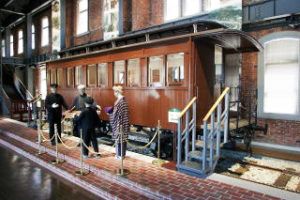Kawachi Reservoir
The first-class civil construction heritage, the triggered the registration of World Cultural
Heritage of Sites of Japan’s Meiji Industrial Revolution
The Kawachi Reservoir was constructed for the industrial water supply to Yawata
Steel Works. The dam was constructed at the Okura River and upper stream of the
dam was expanded and making the 7milion cubic metre reservoir.
 |
 |
 |
Specification of the dam
・completion year : 1927
・height : 43.1 metre
・Width : 189 metre
In the construction of the dam, the unprecedented design in the world has been applied in order
to harmonize with nature and to save the construction cost. The stones come out from the mountain
when the river was expanded have been utilized for construction of the dam.
 |
 |
 |
All stones are cut into sizes and shapes by the stone technicians according to the place of use.
The large size stone were used at the main construction of the dam and the small size stones
were used for other places as per size and shape. Construction was started in 1919 and was
completed in1927 by 900 thousand total number of workers.
 |
 |
 |
 |
 |
 |
General information
| Address | Kawachi, Yahata-higashi-ku, Kitakyushu-city, Fukuoka-prefecture |
| Access |
30 minutes by a vehicle from JR Kokura Station |

Home Our Services About us Contact us Terms and Conditions Privacy Policy
History of Industrial modernization
Japanese industry at the end of 19th century was 200years behind. After Mathew C Perry
came to Japan in 1853, Japan’s industrial Revolution was started.
Since Japan’s modern Steel Industry operation commenced in 1901 in Kitakyushu,
Japan became the world’s leading industrialized country in only 100 years.
 |
 |
 |
There is the KAIZEN strategy in the background to Japan becoming an industrialized country at a
rapid speed. The literary meaning of KAIZEN is improvement, refer to activities that continuously
improve all the functions applies to manufacturing process, purchasing and logistics, involve all the
employees form top management to site workers. KAIZEN is applied for many companies in Japan
and is greatly contributed to Japan’s Industry.
・1641 Dejima, a small artificial island was opened as Dutch trading port in Nagasaki
Nagasaki is the only place opened to oversea countries during the National isolation period
from 1639 to 1854.
・1853 Mathew C Perry came to Uraga;
the Commodore of the US navy, who played a significant role in Japanese history,
succeeded in opening Japan to foreign countries Japanese industry was 200years
behind European countries at that time
・1853 Japanese’s industrial revolution started in Saga, Kagoshima and any other places
・1867 The sovereignty of Tokugawa Shogunate was returned to imperial court
・1868 Meiji Restoration
the most important event in Japanese history, which heralded a new era of modernization
in Japan. This revolution restored the imperial rule to Japan after more than 250years of
Tokugawa Shogunate, bringing about a major shift in political and cultural structure.
National Slogan was Fukoku-kyohei, means “Enrich the country and strengthen the military”
to promote industries and strengthen Japan against Western power.
・1897 The Meiji Government made the decision to build the Imperial Steel Work in the small village
in Higashida, Yahata, next to the Dokai Bay and close to the coal-rich Chikuho area
・1899 First Head Office of the Imperial Steel Works registered on the World Heritage was built
・1900 The Former Forge Shop and the Repair Shop of the Imperial Steel Works registered
on the World Heritage were built
・1901 Operation of the Imperial Steel Work, in Yahata was commenced
In the beginning of the Blast Furnace was not successful, and then Japanese engineer
Kageyoshi Noro modified the design and successful operation followed in 1904
・1915 Yaskawa Electric establish in Kitakyushu
・1917 TOTO establish in Kitakyushu
・1945 The Atomic bombs were dropped in Hiroshima on August 6 and in Nagasaki on August 9
・1960’s Experience the industrial pollution problems
・1962 Higashida No.1 Blast Furnace 10th was blown in
・1963 Kitakyushu-city was born, five municipal cities ( Moji, Kokura, Yahata, Wakamatsu and
Tobata) were equally merged; that was a very rare case in the world as each the cities
had such different personality
・1972 Higashida No.1 Blast Furnace 10th was blown off late 1980s’ the structural flaw in
Japanese economy came to the surface and culming in collapse of bubble economy
・1990 Kitakyushu-city received the “Global 500 Award” given by the UN Environment Program
(UNEP) to individuals and organizations that combat environmental issues, and it was
first local government to win the award in Japan.
・2001 Kitakyushu Eco-Town Center opened first in Japan
・2008 Kitakyushu-city was designated as the Environmental Model City
・2011 Kitakyushu-city was designated as the Environmental Future City
・2015 Site of Japan’s Meiji Industrial Revolution is registered on the list of World Cultural Heritage
Related sites to the Study tour
Study tour in Kitakyushu Study tour in Nagasaki History of Industrial modernization
History of Japanese Christianity Environmental Future city Kitakyushu
Home Our Services About us Contact us Terms and Conditions Privacy Policy
Mejiro Limestone Cave
It is the longest cave in Hiraodai Karst, over 2 km in length. The highlight of this cave
is the monolithic ceiling which is a very unique structure as a limestone caves.
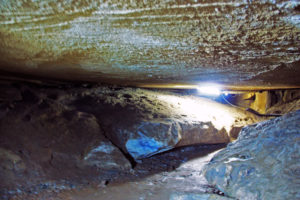 |
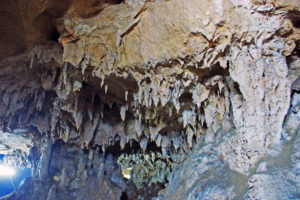 |
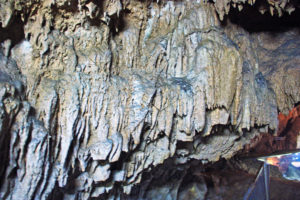 |
General information
| Address | 3-1-1 Horadai, Kokura-minamiku, Kitakyushu-city, Fukuoka-prefecture |
| Access |
45 minutes by a vehicle from JR Kokura Station 80 minutes by a vehicle from Fukuoka-city 80 minutes by a vehicle from Usa 100 minutes by a vehicle from Beppu 100 minutes by a vehicle from Yufuin |
| Open hours |
10:00 to 17:00 |
| Admission fee | JPY 500 |
| Days closed | No regular closing days |

Home Tailor-made tours Study tours Christian Pilgrimage tours Golf tour Kyushu tour packages
Ojika Limestone Cave
The cave is called footfall of dinosaurs. It is the very rare cave in Japan; the entrance
is vertical pit with 25 meter, when getting down to the bottom, you follow the underground
horizontal cave and you can see the hidden aspects of Hiraodai Karst.
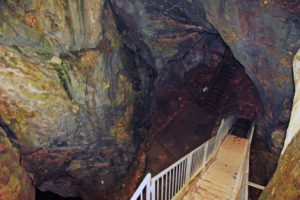 |
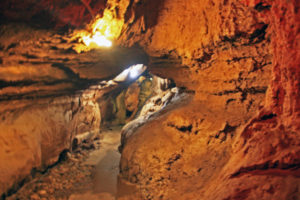 |
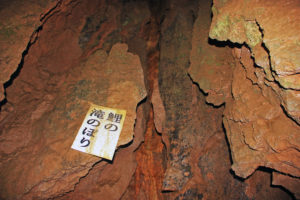 |
General information
| Address | 2-6-58 Horadai, Kokura-minamiku, Kitakyushu-city, Fukuoka-prefecture |
| Access |
45 minutes by a vehicle from JR Kokura Station 80 minutes by a vehicle from Fukuoka-city 80 minutes by a vehicle from Usa 100 minutes by a vehicle from Beppu 100 minutes by a vehicle from Yufuin |
| Open hours |
10:00 to 17:00 |
| Admission fee | JPY 500 |
| Days closed | No regular closing days |

Home Tailor-made tours Study tours Christian Pilgrimage tours Golf tour Kyushu tour packages
Hirotani Wetland
It is the only wetland in Fukuoka-prefecture. Located 600 meters west from Seiryu Cave
and 2,500 m east from Hiraodai Nature Observation Center. The wetland is an important
part of Hiraodai Karst landform, offering a variety of wetland plant life such as the Sagiso
(rein orchis), Tokiso (pogonia), and Nohanasyobu (iris).
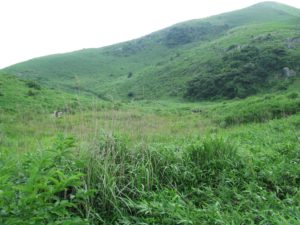 |
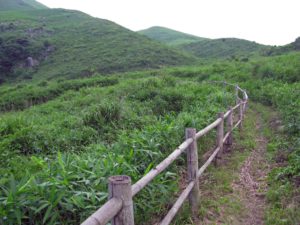 |
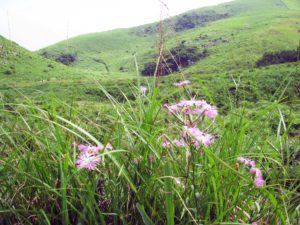 |
General information
| Address |
located in north-east side of Fukuoka-prefecture Kokura-minami-ku and Kanda-machi Miyako-gun |
| Access |
40 minutes by a vehicle from JR Kokura station to Hiraodai Nature Center 40 minutes walk from Hiraodai Nature Center to Hirotani Wetland |

Home Tailor-made tours Study tours Christian Pilgrimage tours Golf tour Kyushu tour packages
Tanga Market
Typical Japanese market, known as “the kitchen” in Kitakyushu-city. There are more than
120 shops in the 180 metre-long arcade. Here you get a true taste of the culture and sample
the real life style of the people living in Kitakyushu. You can find fresh, inexpensive fish,
vegetables and meats, as well as local specialties such as karashi mentaiko ( fish roe seasoned
with tasty spices and sauce) and nukamiso daki (boiled fish with paste made from rice bran
and soy beans).
 |
 |
 |
 |
 |
 |
Tanga Yatai
At night time, food stalls called Yatai open in the square in front of Tanga Market.
Here you can try delicious oden (a stew made from various ingredients) and ramen.
 |
 |
 |
General information
| Address | Uomachi, Kokura-kitaku, Kitakyushu-city, Fukuoka-prefecture |
| Access |
15 minutes walk from JR Kokura Station through Kyomachi and Uomachi arcade shopping street 10 minutes walk from Kokura Castle and River Walk Kitakyushu |

Home Tailor-made tours Study tours Christian Pilgrimage tours Golf tour Kyushu tour packages
Kyushu Railway Museum
It is a railway theme park organized by JR Kyushu, showing the history of Kyushu Railways.
Consists of 3 areas; main building, train exhibition hall and mini railroad park. The main
building has diverted from the original Kyushu Railway Headquarters red brick building built
in 1891.
|
Steam locomotive C59 manufactured in 1941 |
Electric limited express train manufactured 1969 |
Exhibit the trains used during Meiji era |
 |
 |
 |
 |
 |
 |
General information
| Address | 3-29 Kiyotaki, Moji-ku, Kitakyushu-city, Fukuoka-prefecture |
| Access |
A Short walk from JR Mojiko Station |
| Open hours | 9:00 to 17:00 |
| Admission fee | JPY 300 |
| Days closed | 2nd Wednesday except August, 2nd Wednesday and Thursday in July |

Home Tailor-made tours Study tours Christian Pilgrimage tours Golf tour Kyushu tour packages
Senbutsu Limestone Cave
The largest limestone caves in Hiraodai Karst Plateau, extending about 900 m while
meandering toward the northeast. Senbutsu Literally means 1,000 Buddha Cave and
the shape of the cave is narrow. The narrow ceiling ravine with a maximum width of
10 m and a maximum ceiling height of 15 m.
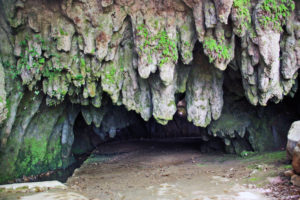 |
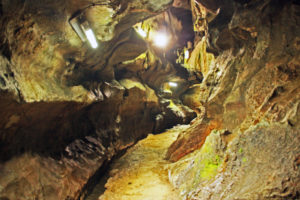 |
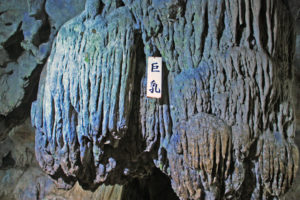 |
Approximately 30 large and small stalactites hang down at the entrance, giving a spectacular scenery.
Abundant groundwater still continues to erode in the cave.
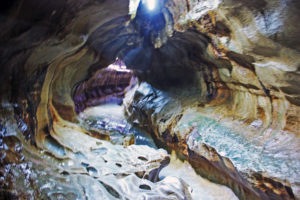 |
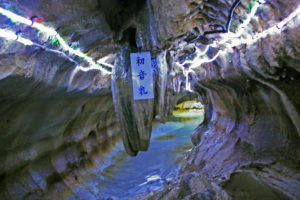 |
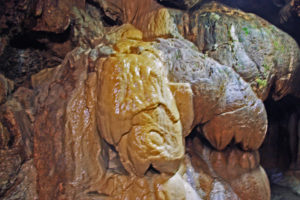 |
General information
| Address | 3-2-1 Kokura-minakiku, Kitakyushu-city, Fukuoka-prefecture |
| Access |
45 minutes by a vehicle from JR Kokura Station 80 minutes by a vehicle from Fukuoka-city 80 minutes by a vehicle from Usa 100 minutes by a vehicle from Beppu 100 minutes by a vehicle from Yufuin |
| Open hours |
9:00 to 17:00 Week day 9:00 to 18:00 Saturday, Sunday and National holidays |
| Admission fee | JPY 800 |
| Days closed | No closing days |

Home Tailor-made tours Study tours Christian Pilgrimage tours Golf tour Kyushu tour packages
Kanmonkyo bridge
Kanmonkyo Bridge is the suspended bridge crossing the Kanmon Straits, a stretch of water
separating two of Japan’s four main islands. On the Honshu side of the bridge is Shimonoseki
and on the Kyushu side is Kitakyushu-city. The Kanmonkyo bridge was opened to vehicles
in 1973 and connected the Kyushu Expressway in 1984. It is the 34th largest suspension bridge
in the world with a central span of 712 meters.
 |
 |
 |
The Kanmon Straits, separating Honshu and Kyushu, is a very busy waterway with as many as
700 small and large ships a day passing through it. There are a total of seven ways to cross the
straits such as the 1,068-meter-lomg “Kanmon-kyo Bridge”, the “Shin-Kanmon Tunnel” , the
“Kanmon Pedestrian Tunnel”, to cross on foot, the “ferries”, and the like.
 |
 |
 |
Only the place in the world ! You can cross the strait on foot. The Kanmon Strait, separating
Honshu and Kyushu, is a very beautiful and busy waterway with as many as 700 small and
large ships a day passing through it.
 |
 |
 |
General information
| Address |
Moji-ku, Kitakyushu-city, Fukuoka-prefecture Shimonoseki-city, Yamaguchi-prefecture |
| Access | 30 minutes by a vehicle from JR Kokura Station |

Home Tailor-made tours Study tours Christian Pilgrimage tours Golf tour Kyushu tour packages
Blue Wing Moji
This bridge, made in 2003, is the only pedestrian draw bridge in Japan, and is one the most
popular photo spot in Mojiko Retro. The length of the bridge is 108 meters and it is opened
6 times a day at 10h, 11h, 13h, 14h, 15h and 16h. When a ship passes through, the main
24-meter span and the secondary 14-meter span are raised 60 degrees from the horizontal.
Don’t miss a beautiful sunset.
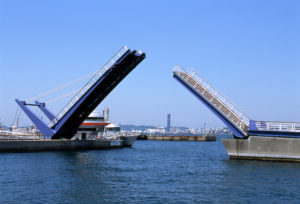 |
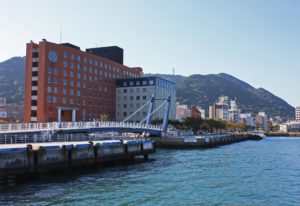 |
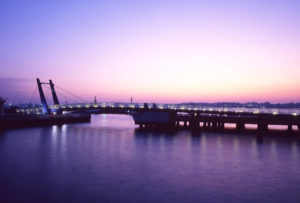 |
General information
| Address | 4-1 Minato-machi, Moji-ku, Kitakyushu-city, Fukuoka-prefecture |
| Access | 5 minutes walk from JR Mojiko Station |




